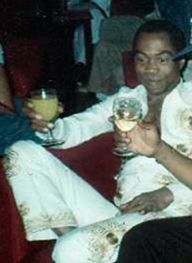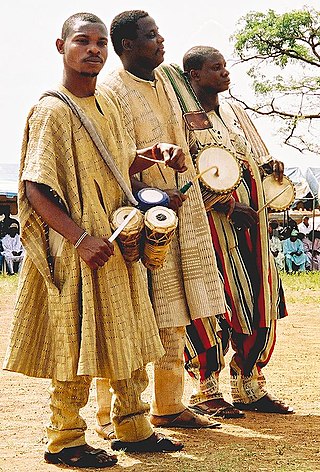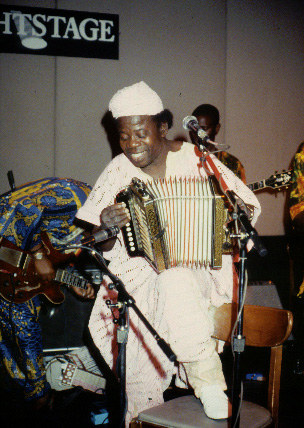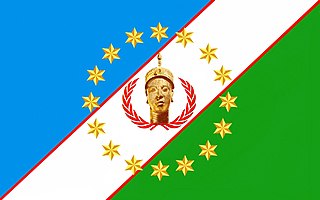
Afrobeat is a Nigerian music genre that involves the combination of West African musical styles from mainly Nigeria such as the traditional Yoruba and Igbo music and highlife with American funk, jazz, and soul influences. With a focus on chanted vocals, complex intersecting rhythms, and percussion. The style was pioneered in the 1960s by Nigerian multi-instrumentalist and bandleader Fela Kuti, who is most known for popularizing the style both within and outside Nigeria. At the height of his popularity, he was referred to as one of Africa's most "challenging and charismatic music performers."

Highlife is a music genre that started in West Africa, along the coastal cities of present-day Ghana in the 19th century, during its history as a colony of the British and through its trade routes in coastal areas. It describes multiple local fusions of African metre and western jazz melodies. It uses the melodic and main rhythmic structures of traditional African music, but is typically played with Western instruments. Highlife is characterized by jazzy horns and guitars which lead the band and its use of the two-finger plucking guitar style that is typical of African music. Recently it has acquired an uptempo, synth-driven sound.

The music of Nigeria includes many kinds of folk and popular music. Little of the country's music history prior to European contact has been preserved, although bronze carvings dating back to the 16th and 17th centuries have been found depicting musicians and their instruments. The country's most internationally renowned genres are Indigenous, Apala, Aurrebbe music, Rara music, Were music, Ogene, Fuji, Jùjú, Afrobeat, Afrobeats, Igbo highlife, Afro-juju, Waka, Igbo rap, Gospel, and Yo-pop. Styles of folk music are related to the over 250 ethnic groups in the country, each with their own techniques, instruments, and songs. The largest ethnic groups are the Igbo, Hausa and Yoruba. Traditional music from Nigeria and throughout Africa is often functional; in other words, it is performed to mark a ritual such as the wedding or funeral and not to achieve artistic goals. Although some Nigerians, especially children and the elderly, play instruments for their own amusement, solo performance is otherwise rare. Music is closely linked to agriculture, and there are restrictions on, for example, which instruments can be played during different parts of the planting season.

Fela Aníkúlápó Kútì, also famously known as Abàmì Ẹ̀dá, was a Nigerian musician, bandleader, composer, political activist, and Pan-Africanist. He is regarded as the King of Afrobeat, a Nigerian music genre that combines West African music with American funk and jazz. At the height of his popularity, he was referred to as one of Africa's most "challenging and charismatic music performers". AllMusic described him as "a musical and sociopolitical voice" of international significance.

Yoruba is a language that is spoken in West Africa, primarily in Southwestern and Central Nigeria. It is spoken by the ethnic Yoruba people. The number of Yoruba speakers is roughly 45 million, plus about 2 million second-language speakers. As a pluricentric language, it is primarily spoken in a dialectal area spanning Nigeria, Benin, and Togo with smaller migrated communities in Côte d'Ivoire, Sierra Leone and The Gambia.

Chief Sunday Adeniyi Adegeye, known professionally as King Sunny Adé, is a Nigerian jùjú singer, songwriter and multi-instrumentalist. He is regarded as one of the first African pop musicians to gain international success, and has been called one of the most influential musicians of all time.
Fújì is a popular Yoruba musical genre. It arose from the improvisational wéré music, also known as ajísari, a genre of music performed to wake Muslims before dawn during the Ramadan fasting season. Alhaji Sikiru Ayinde Barrister popularized wéré music during the 1950s and 60s and conceived the term "fújì" in an unusual way. According to Barrister, "I came up with it when I saw a poster at an airport, advertising the Mount Fuji, which is the highest peak in Japan." Fújì should not be mistaken for the Yorùbá words "fuja" or "faaji," which mean leisure or enjoyment.
Jùjú is a style of Yoruba popular music, derived from traditional Yoruba percussion. The name juju from the Yoruba word "juju" or "jiju" meaning "throwing" or "something being thrown". Juju music did not derive its name from juju, which is a form of magic and the use of magic objects, common in West Africa, Haiti, Cuba and other South American nations. It evolved in the 1900s in urban clubs across the countries, and was believed to have been created by Ababababaa Babatunde King, popularly known as Tunde King. The first jùjú recordings were by King and Ojoge Daniel in the 1920s, when King pioneered it. The lead and predominant instrument of jùjú is the Iya Ilu, talking drum.

Yoruba music is the pattern/style of music practiced by the Yoruba people of Nigeria, Togo, and Benin. It is perhaps best known for its extremely advanced drumming tradition and techniques, especially using the gongon hourglass shape tension drums. Yoruba folk music became perhaps the most prominent kind of West African music in Afro-Latin and Caribbean musical styles; it left an especially important influence on the music used in Santería practice and the music of Cuba.

Isaiah Kehinde Dairo MBE was a Nigerian Jùjú musician.
The agidigbo or ‘’’molo’’’ is a large traditional plucked lamellophone thumb piano used by the Yoruba people of Nigeria to play apala music.

The Yoruba people are a West African ethnic group who mainly inhabit parts of Nigeria, Benin, and Togo. The areas of these countries primarily inhabited by the Yoruba are often collectively referred to as Yorubaland. The Yoruba constitute more than 48 million people in Africa, are over a million outside the continent, and bear further representation among members of the African diaspora. The vast majority of the Yoruba population is today within the country of Nigeria, where they make up 20.7% of the country's population according to Ethnologue estimations, making them one of the largest ethnic groups in Africa. Most Yoruba people speak the Yoruba language, which is the Niger-Congo language with the largest number of native or L1 speakers.
Gbedu literally means "big drum" and is a percussion instrument traditionally used in ceremonial Yoruba music in Nigeria and Benin. More recently, the word has come to be used to describe forms of Nigerian Afrobeats music.

The Sakara drum is one of the four major families of Yoruba drums of Nigeria. The other families are the Dundun/Gangan or talking drum, the Batá drum and the Gbedu drum. Each family includes drums of different sizes, with the mother drum playing the lead role and other drums playing in support. The Sakara is also made and used by the Hausa people of northern Nigeria.

Aṣíkò (Ashiko) is a musical genre similar to sákárà music from Nigeria, West Africa. Aṣíkò was the Christian version of sákárà (Sakara).

Remilekun Khalid Safaru, known by his stage names Reminisce and Alaga Ibile, is a Nigerian singer, rapper, songwriter, and actor originating from Ogun State. He performs in English and in his native language, Yoruba.
Sikiru Ololade Ayinde Balogun, MFR, better known by his stage name Ayinde Barrister was a Nigerian-born Yoruba singer-songwriter, songproducer and music performer. He is regarded as a pioneer of Fuji and Wéré music. After his first break into music in 1965, Ayinde Barrister went on to release over 70 studio albums.
Dadakuada is a type of Yoruba performance art form which originated from and is popular among the people of Kwara.
Abibu Oluwa was a Nigerian musician known who was an early exponent of the Yoruba musical genre, Sakara. He is regarded as the first breakout start of musical genre music. Oluwa was prominent in the late 1920s and 1930s when he recorded for Odeon, HMV and Parlophone Records. His recordings with Odeon were one of the earliest Yoruba musical recordings; he sang many praise songs of Lagos elites of his time.









